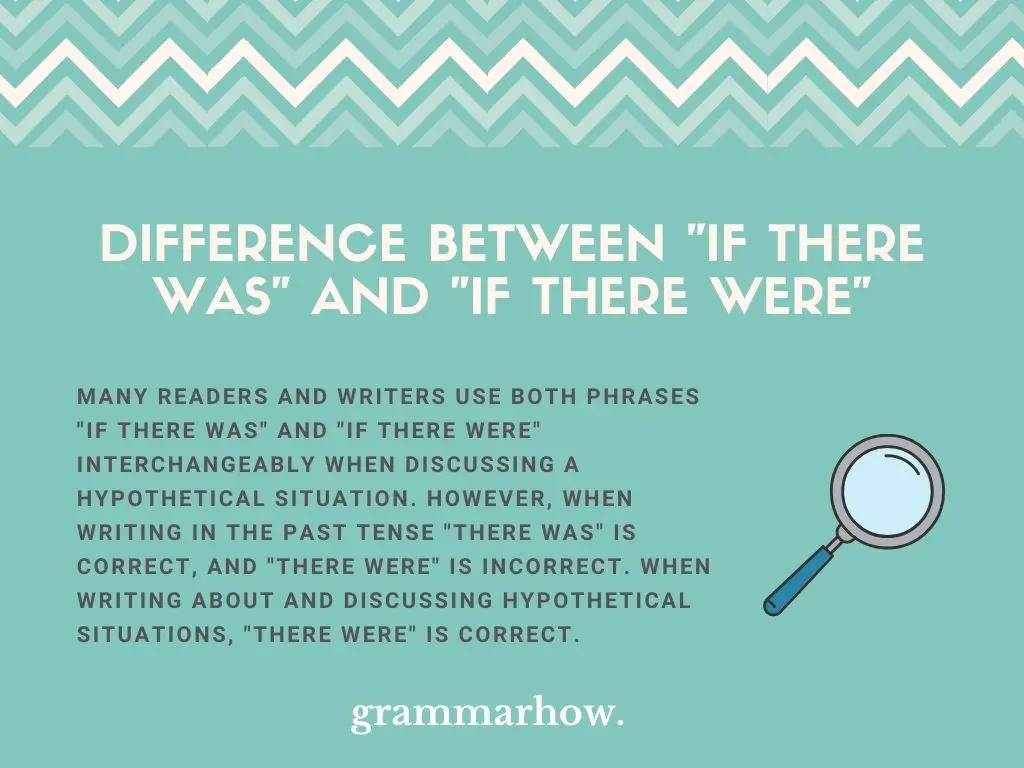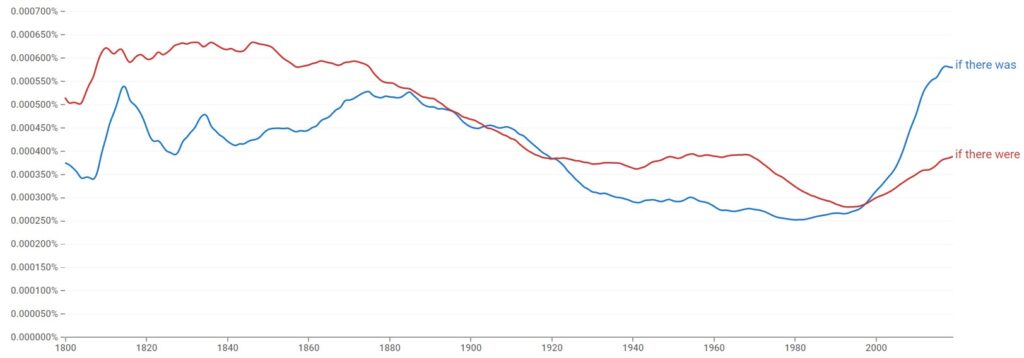The difference between the two phrases “if there was” and “if there were” can be a difficult subject to comprehend for even the more advanced readers and writers. This simple article aims to make understanding the difference easier, to allow you to structure your sentences correctly.
What Is The Difference Between “If There Was” And “If There Were”?
Many readers and writers use both phrases “if there was” and “if there were” interchangeably when discussing a hypothetical situation. However, when writing in the past tense “there was” is correct, and “there were” is incorrect. When writing about and discussing hypothetical situations, “there were” is correct.

Indeed, whilst these two phrases look and sound similar, “if there was” and “if there were” are not interchangeable and the context of the sentence is important.
“If there was” should be used in conditional past tense sentences and “If there were” should be used in the subjunctive mood.
When Should I Use “If There Was”?
The phrase “if there was” should be used in the past tense. The conditional conjunction “if” illustrates that one action depends on another in the sentence. “If there was” precedes an adjective phrase that describes the sentence scenario. The word “was” means that the situation in the sentence is realistic.
To help you to understand when to use the phrase “if there was” in a sentence, refer to the following simple examples:
- If there was tea and hot chocolate, there was bound to be coffee in the supermarket aisle.
- I was wondering if there was anything I could do to help you because you seemed to be in distress.
- If there was any evidence she had stolen the chocolate I would have taken action immediately.
When Should I Use “If There Were”?
The phrase “if there were” should be used when describing a subjunctive mood. A subjunctive mood is when the situation is described in the sentence is doubtful or hypothetical. In contrast to sentences using “if there was”, the phrase “if there were” should be used in cases contrary to reality.
When using “if there were” in a sentence the sentence is conditional. This means that one action is reliant upon the other.
To help you to understand when to use the phrase “if there was” in a sentence, refer to the following simple examples:
- If there were millions of dollars in my bank account, I would never have to work for money again.
- If there were more bright and friendly students like John, the school would be a better place.
- If there were more children in the neighborhood, Mike might be a more sociable child.
Is It “If There Was Ever” Or “If There Were Ever”?
Considering the two phrases “if there was ever” and “if there were ever”, the phrase “if there were ever” is correct to use in a sentence. This is because the word “were” is the conditional or subjunctive form of the verb “to be”.
By including the words “if” and “ever” in the sentence, the sentence becomes hypothetical or doubtful; a subjunctive sentence.
To help you to understand the correct phrase to use in a sentence, refer to the following simple examples to illustrate the correct and incorrect usage of “if there was ever” and “if there were ever”:
- Correct: If there were ever increases in the staff wages, Harry could purchase the computer he was looking for.
- Incorrect: If there was ever increases in the staff wages, Harry could purchase the computer he was looking for.
- Correct: If there were ever reasons to doubt James, there definitely is now.
- Incorrect: If there was ever reasons to doubt James, there definitely is now.
Is It “If There Was Any Other Way” Or “If There Were Any Other Way”?
Considering the two phrases “if there was any other way” and “if there were any other way”, the phrase “if there was any other way” is correct to use in a sentence. This is because “was” is singular and so is the word “way”, so the phrase “if there was any other way” makes sense.
The phrase “if there were any other way” is incorrect to use in a sentence” because the word “were” indicates the plural and “way” is singular.
To help you to understand the correct phrase to use in a sentence, refer to the following simple examples to illustrate the correct and incorrect usage of “if there was any other way” and “if there were any other way”:
- Correct: If there was any other way to travel to the train station, James would have already found it.
- Incorrect: If there were any other way to train to the train station, James would have already found it.
- Correct: If there was any other way to improve Daniel’s mood, Sarah would have been keen to find out.
- Incorrect: If there were any other way to improve Daniel’s mood, Sarah would have been keen to find out.
Is “If There Was” Or “If There Were” Used The Most?
Currently, the phrase “if there was” is used more in sentences than the phrase “if there were”.
This graph from Google Ngram Viewer shows the usage of the phrases “if there was” and “if there were” during the period 1800 to 2019. The blue line represents the usage of the phrase “if there was” and the red line represents the usage of the phrase “if there were”.

As the graph illustrates, the phrase “If there was” is currently used the most, but over the years usage of the two phrases have fluctuated.
Final thoughts
This article has explained that when writing in the past tense “there was” is correct, and “there were” is incorrect. When writing about and discussing hypothetical situations, “there were” is correct. “If there was” should be used in conditional past tense sentences and “If there were” should be used in the subjunctive mood. Currently, the phrase “if there was” is used more often than “if there were” although usage of the two phrases has fluctuated over the years.
You may also like:
“If I Was” vs. “If I Were” – Explained For Beginners (Helpful Examples)
Wasn’t vs. Weren’t: Complete Grammar Guide (15+ Examples)

Martin holds a Master’s degree in Finance and International Business. He has six years of experience in professional communication with clients, executives, and colleagues. Furthermore, he has teaching experience from Aarhus University. Martin has been featured as an expert in communication and teaching on Forbes and Shopify. Read more about Martin here.
